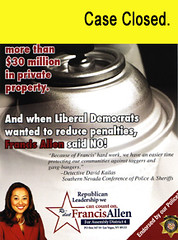Many local stations and newscasters attribute former Assemblywoman Francis Allen’s primary loss to her domestic violence charge that was dropped after her soon-to-be former husband recanted his police statement. In reality, it was near constant credibility erosion and inconsistent communication that killed her career.
Here is a truncated hot list from various political mailers and news reports:
• Promised to be strongly opposed to taxes, but would not sign the Taxpayer Protection Pledge in a district that expects it.
• Was engaged in several ethics complaints. The most recent was filed by a florist after Allen cancelled a check for more than $5,000 for wedding flowers. The business never recovered.
• Sponsored several questionable bills, including one that would have allowed homeowner’s associations to raise fees without resident approval. But Allen was not familiar enough with the bill to address the section that caused it to be vetoed.
• The mailer that claimed an erroneous endorsement that she didn’t have. This was not the first time it occurred during her political career. It was the second.
• The political mailer that seemed to exploit her martial problems after the stabbing scandal and included disparaging remarks about her husband despite the fact he had recanted his story.
There are almost a dozen more, which was my point in a post several days ago. While there is rarely a silver bullet, the daily wear and tear of individual brands will eventually be unrecoverable.
While Allen would have faced a challenging race, the difference between winning and losing came down to a few bad communication choices and an unwillingness to apply the better remedies:
• Allen could have ended speculation about the Taxpayer Protection Pledge by either just signing it or addressing her reasons for not signing it.
• Allen could have offered full disclosure on the complaints, her views, and their outcomes. While voters might not have agreed with her, they may have dismissed some of them.
• Allen could have explained her reasoning on the passage of certain bills, but only attempted to claim she didn’t sponsor them.
• Given the circumstances, Allen should have never claimed the endorsement. At minimum, she should have double-checked with each association.
• While most of the candidates avoided discussing the stabbing scandal, Allen seemed to bring it up frequently. Her decision to run to the problem with a political mailer was ill advised. However, if it did need to be addressed, it needed to be addressed differently and should have avoided any opinions about her husband or whether or not they would be divorced.
Unfortunately for her, communication never seemed to be a strong point. In her concession to challenger Richard McArthur, Allen claimed to have run a positive race. Some people might not agree with that assessment, including voters.
McArthur, a United States Air Force veteran and retired FBI agent, comfortably beat Allen by a 2-to-1 margin in the four-way primary. He had been campaigning door-to-door for 10 months. In addition to some signage and an extensive grass roots campaign, he sent several introduction and contrast mailers that resonated with registered voters. Tomorrow, he’ll start again.
In contrast, Allen relied almost exclusively on name recognition (signage) and direct mail (one-way communication). Case closed.

Here is a truncated hot list from various political mailers and news reports:
• Promised to be strongly opposed to taxes, but would not sign the Taxpayer Protection Pledge in a district that expects it.
• Was engaged in several ethics complaints. The most recent was filed by a florist after Allen cancelled a check for more than $5,000 for wedding flowers. The business never recovered.
• Sponsored several questionable bills, including one that would have allowed homeowner’s associations to raise fees without resident approval. But Allen was not familiar enough with the bill to address the section that caused it to be vetoed.
• The mailer that claimed an erroneous endorsement that she didn’t have. This was not the first time it occurred during her political career. It was the second.
• The political mailer that seemed to exploit her martial problems after the stabbing scandal and included disparaging remarks about her husband despite the fact he had recanted his story.
There are almost a dozen more, which was my point in a post several days ago. While there is rarely a silver bullet, the daily wear and tear of individual brands will eventually be unrecoverable.
While Allen would have faced a challenging race, the difference between winning and losing came down to a few bad communication choices and an unwillingness to apply the better remedies:
• Allen could have ended speculation about the Taxpayer Protection Pledge by either just signing it or addressing her reasons for not signing it.
• Allen could have offered full disclosure on the complaints, her views, and their outcomes. While voters might not have agreed with her, they may have dismissed some of them.
• Allen could have explained her reasoning on the passage of certain bills, but only attempted to claim she didn’t sponsor them.
• Given the circumstances, Allen should have never claimed the endorsement. At minimum, she should have double-checked with each association.
• While most of the candidates avoided discussing the stabbing scandal, Allen seemed to bring it up frequently. Her decision to run to the problem with a political mailer was ill advised. However, if it did need to be addressed, it needed to be addressed differently and should have avoided any opinions about her husband or whether or not they would be divorced.
Unfortunately for her, communication never seemed to be a strong point. In her concession to challenger Richard McArthur, Allen claimed to have run a positive race. Some people might not agree with that assessment, including voters.
McArthur, a United States Air Force veteran and retired FBI agent, comfortably beat Allen by a 2-to-1 margin in the four-way primary. He had been campaigning door-to-door for 10 months. In addition to some signage and an extensive grass roots campaign, he sent several introduction and contrast mailers that resonated with registered voters. Tomorrow, he’ll start again.
In contrast, Allen relied almost exclusively on name recognition (signage) and direct mail (one-way communication). Case closed.























